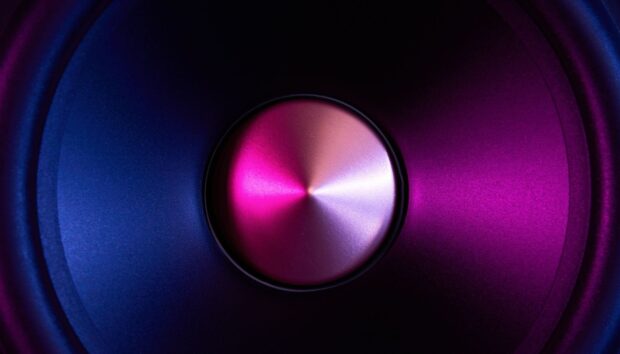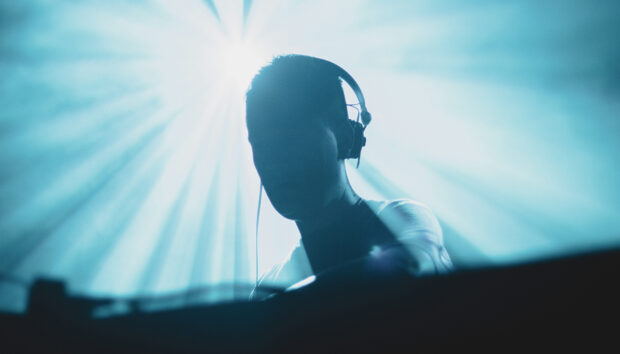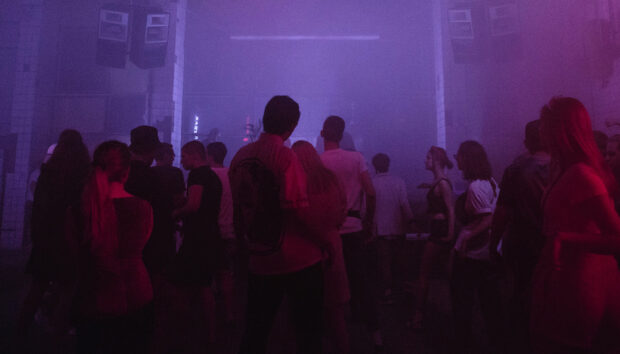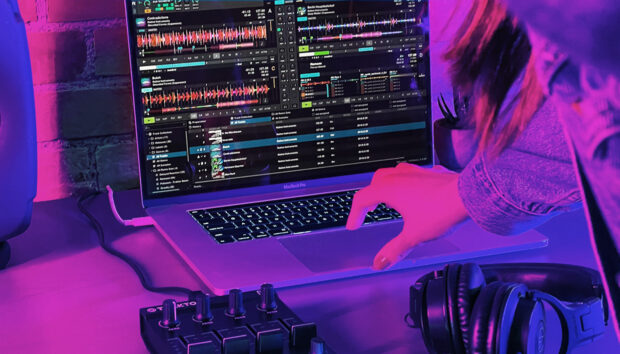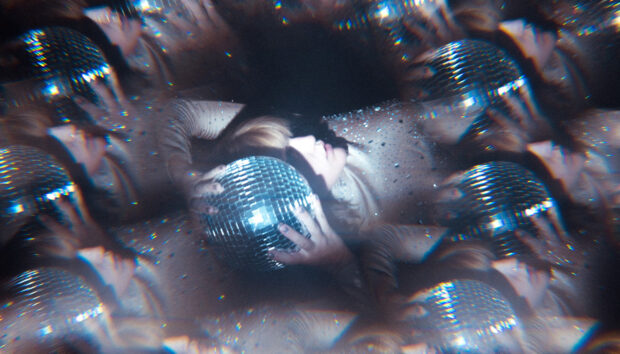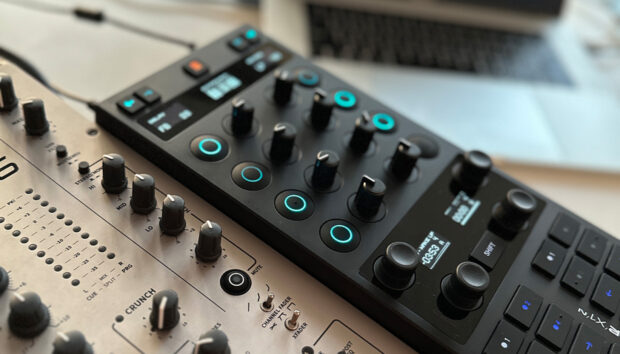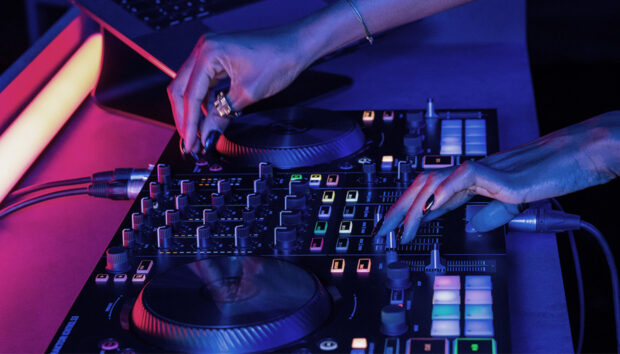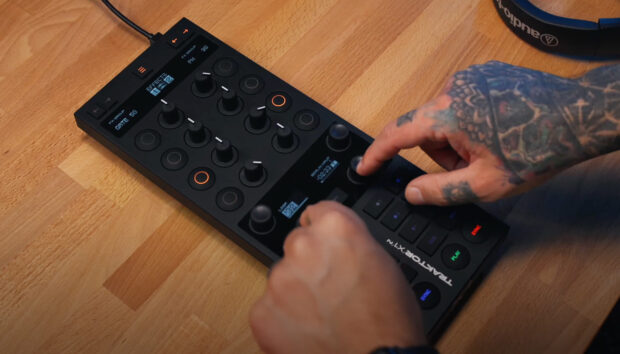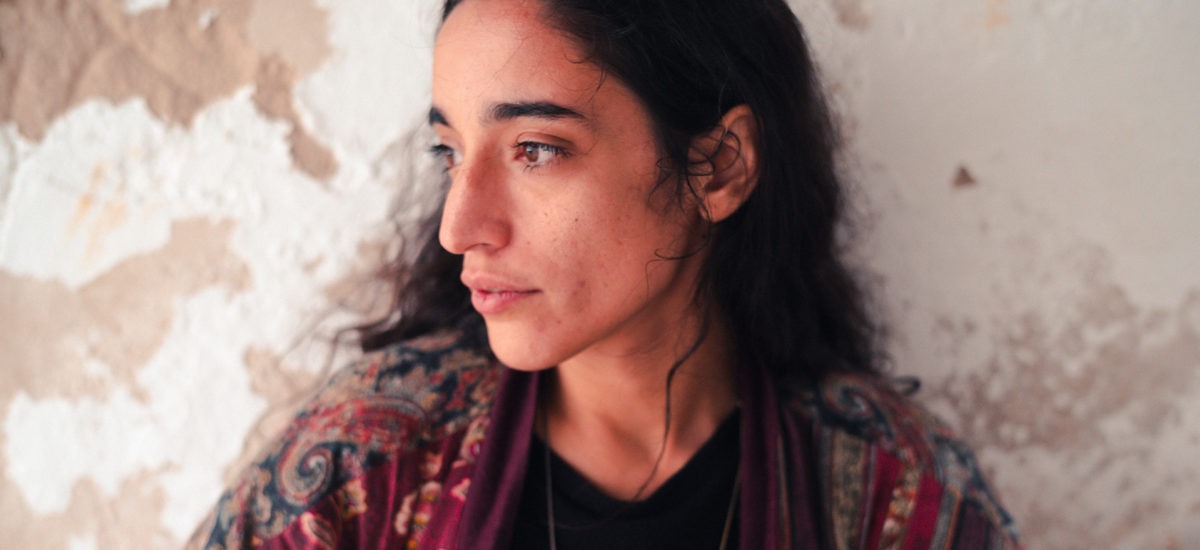
A key player in the Palestinian underground scene, DJ SAMA’ cuts an impressive figure against the backdrop of a subculture that has – against the odds – grown into one of the freshest and most exciting in the world.
From playing parties in and around the city of Ramallah to stages across the world, SAMA”s sound has developed into a unifying, essentially optimistic and honest strain of techno that transcends borders and boundaries, and proves the oft-quoted adage that music has the power to bring people together.
You started DJing as a kid…
I started DJing when I was 13 – my dad says nine. I used to play whatever came on the radio. Arabic music, pop music, whatever people want to listen to at a birthday… whatever was known. Back then we didn’t have many DJs. We had wedding DJs, which were really expensive, but for a birthday or whatever we didn’t have DJs – so we used to either play the radio, or fight over whose CDs we’d put on.
In the beginning it was always the radio, but the problem was that there was the Intafada then, so the tracks would always be cut by the news, “BREAKING NEWS: GOD KNOWS WHAT HAPPENED!”
So we’d start burning CDs and taking them to the party, and then fighting over who gets to play their track. At one point I was like, “I’m gonna choose the music.” My dad has an event management company, he has speaker and players. So I’d borrow them from him, set them up, and play music for my friends.
So you were EQing and mixing back then?
Oh I learned that when I was 19. Back then it was about having actual speakers and music. That was the part that was important for us. It wasn’t about really DJing or making music or anything like that, we just needed a music player.
I would even be dancing in the crowd, and reach over the booth to press play and switch the faders, and then go dance again.
I began to learn when I first went clubbing. We had no clubs in Palestine, but I studied in Beirut and started going to clubs and was like “Oh I’m not a DJ, I don’t know what he’s doing! I’m pressing play and switching faders.”
So you picked up clubbing in Beirut, and then came back to Palestine. What did you play? How were the first nights?
Haha, very bad! The first visit, I brought back some music, and nobody understood what I was playing, and nobody liked it. After I started studying Audio Engineering and Music Production, I really wanted to start sharing that more because I was already playing in Jordan, but not in Palestine.
After trying a while, losing money, and getting mad I met a woman in Ramallah, and she’d just moved there from Haifa and took over a bar and made it happen. She said, “Come play, I’ll make it work.” She went to Haifa, got a huge crowd and DJs from there, and made it work in Ramallah. There were like 80 people dancing, and that made it happen, and it also created this connection between Haifa and Ramallah.
It was initially bringing people from Haifa to Ramallah that kickstarted everything?
In a way. In Haifa, people know electronic music more – they go to Europe and travel around more than us. For us, we’d never heard of it. The first time I heard techno was 2008, which is insane. When I met her, she was like “I know the crowd that listens to this” and she got a bus from Haifa to Ramallah.
So the Ramallah people came to that party, and when they were in the vibe of a techno party, they kind of understood it. So after that she made another party, then another party, then all-day festivals. And it started growing from there, and other organisers began popping up, and now we have a scene! I can just go party now!
Where do you get your music?
I was always an online person. In Beirut, I also became friends with a lot of the DJs who are there. So that gave me access to music, and everybody was sharing it, and my teacher in Jordan was giving me music, and I was buying music from Beatport.
In the beginning it was always trading, exchanging, ripping CDs off each other’s computers. Because in Beirut, yeah you could go and find Michael Jackson CDs, but you couldn’t go and find techno music.
It wasn’t that long ago that I realised there’s Berlin techno and Detroit techno. People would say to me, “You play cool Berlin techno,” and I’d be like, “Oh, cool, I didn’t know!” Because on Beatport I’d listen to everything, and what I liked, I’d buy.
But after I heard that, I decided I need to go see what Berlin is. So my first gig in Europe, before playing – it was in France – I went to Berlin. I was like, “Before I play in Europe, I need to know what the hell I’m playing.” Because apparently I play Berlin techno, but I’d never been to Berlin.
I still have a problem with differences between genres, I don’t like to brag about knowing the difference, because it’s very mixed you know.
Speaking of genres, has Ramallah developed its own sound by now?
We have a lot of really good producers that have been taking from different parts and making their own thing. For example you have Muquata’a, who creates his own noise and glitch sound. He started as a rapper when we were in high school, and now he makes incredible glitch, recording sounds from the streets and making them into something else. Then there’s Bruno Cruz, who did the dub-key music, and at the same time they’re dancing on stage with this folkloric dance. And there’s Zenobia, who make Shaabi music, like the popular music, but crazy electronic. So it’s this mix between your own heritage and what you’ve heard elsewhere.
For me, personally, I grew up learning western music – classical piano – so I never got into Arabic music or Arabic instruments. So I never added these. It might have a bit of that percussion, because I’m into it…
It’s nice when you can break the stereotypes, not [for your music] to be characterized as Arab. People don’t want to leave that behind and go fully-western, but to find somewhere between the two.
How much do you think the scene is defined as being specifically “Palestinian” as opposed to being just another scene?
It’s like any other scene – a community of people who want to connect and enjoy. But it’s also people uniting over something they’re trying to escape. You know Palestine, it’s a bit of a mess living there, so we try to normalize it in a way, stay alive and sane, and not go crazy. Dancing has always been a part of that, and Palestinians dance a lot in general – and have for a long time. So it’s always been related to that, and something new with every war.
I hope we’re resisting with our music…
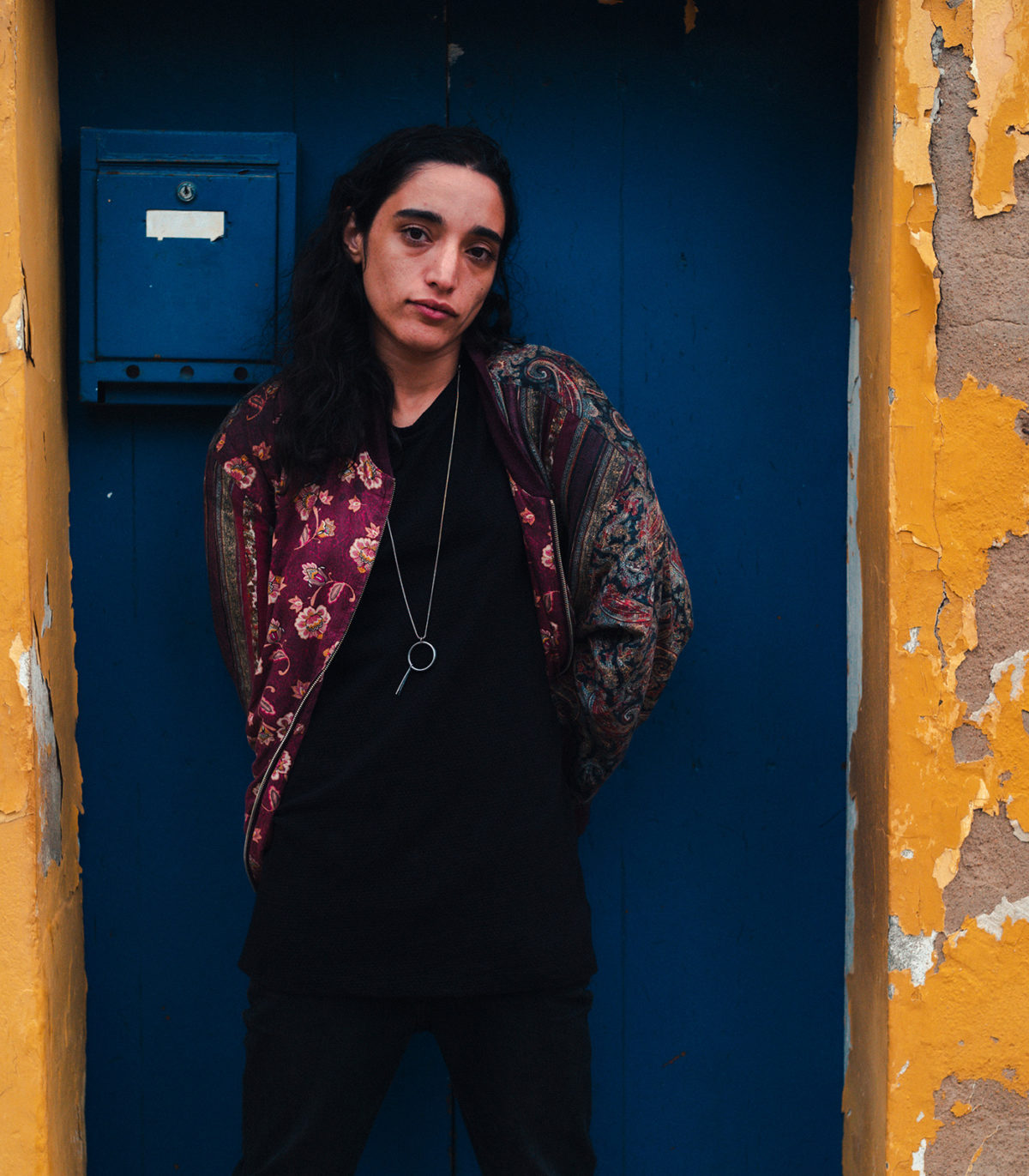
Yeah, there’s always connection between underground culture and wider political or social events – Berlin and the Wall, Euromaidan in Ukraine…
Music kind of grew with wars. Vinyl through WWI, jazz started in a conflict period, genres changed with wars. Techno grew out of Berlin.
I always make this joke that we’re heading toward WWIII, and that the music booms afterwards – so I’m excited for that… everything goes to shit but art flourishes!
It’s true, with every war art flourishes and everything else is destroyed. Whenever there’s oppression, people tend towards alternative modes of expression. At some point you have to find anything, and art is a healthy way of expressing issues, otherwise the whole world would be killing each other. It’s the sad truth!
How do you perceive your role now within the scene?
Actually yesterday I was answering an email interview, and they asked, “How does it feel to be the first female DJ in Palestine?” And the thing is, it wasn’t intentional, it just happened. The scene and the people there gave me so much – you have no idea.
It just kind of made a whole new community, and I try to give back to it.
I see my role as somebody who can help back there, which I try to do – by playing parties, going to workshops, whatever. I’m there when I can be. People send me sets all the time for feedback.. Sometimes it takes me a month to reply, but I reply! If I have the time why not?
What are you looking out for when you’re giving feedback?
It depends. There’s a new kid who sends me stuff, and I give him mixing tips, and I always watch them play. One person, I told him to forget all the effects, and just to focus on the EQ and really get to know it… to know what something’s going to sound like before you do it. I give them different tools – one site for ear training… a perfect set with just the EQ, then with the filter and so on.
The thing is, I love to party. I love to DJ, but I love to party! The thing is, in Palestine, I would play for eight hours, or I’d be the full party. And everybody would be dancing and I’m working (in a way) and dancing my ass off, but I’d still have to be focussed.
But now, I can just go and party in Palestine! Now, man… New Year’s we had the whole crew playing, and the techno stage – 12 hours of perfection.
It sounds like you have a pretty high attention to detail – do you plan your sets?
I kind of plan, especially if it’s between people, or an opening. I’ll imagine what I want to do, and how to reach to where they’re going to start, or pick up from where they finish, or make a transition between two people.
I’ll make a playlist, buy music every week, and choose the tracks for the night, but take everything else with me too. The crowd really has a lot to do with it, sometimes you’ll realise it’s not working and you have to take things somewhere else. So I have an outline, but you never know what happens. I like to have at least my first two tracks, because I’m in panic mode, getting everything working, thinking “I’m gonna play.” And I like to have at least five different options.
Also closing tracks is something I think about a lot – I like storytelling in music. So I concentrate a lot on what DJs do in regard to that. But yeah, I’m so into details.
You’re using the TRAKTOR KONTROL F1 – are you using samples as well?
Yeah, samples from my new album. It’s been “the new album” for the last year and a half! Hopefully it’ll come out soon. But yeah it has a lot of acoustic sounds in a way… some instruments, vocals, ambient sounds, effects like a car or plane. The ones I play the most are the car, plane, and bird. Wherever you hear a car passing by… it’s in the set. It’s all because of the sound design background, from doing movies. The sound effects are the most fun ones.
How often do you use them?
Shitloads! All the time! Especially the bird – sometimes I’ll play melodies with it. The car and the plane sound like noise… I can use them for transitions… open up the filter….
You’re always using four decks then?
Yeah, three definitely. And then the fourth is on and off, depending on what’s happenin or how many elements I need. Or how bad the second track was – if I need to fill it up with elements really fast haha!
You use a couple of effects too…
I mostly use delays and gaters, I’m still learning them. It’s useful in industrial techno, but with melodic techno, the producer already added loads.
Maybe if something’s missing you can fill it out, but if you bought it, it must be good already – you paid money for it, why mess it up? There’s a guy who spent a couple of months creating that, let it play!
I don’t fuck with the production – if I’m gonna skip a part, I’ll skip the whole track because it’s somebody’s track, come on!
Let’s finish with a classic – what does DJing mean to you?
Ooh, free party! Nah – sharing with people, creating a connection… it’s freeing, playing music, letting out what I have.
Check out SAMA’s TRAKTOR DJ 2 playlist here.








